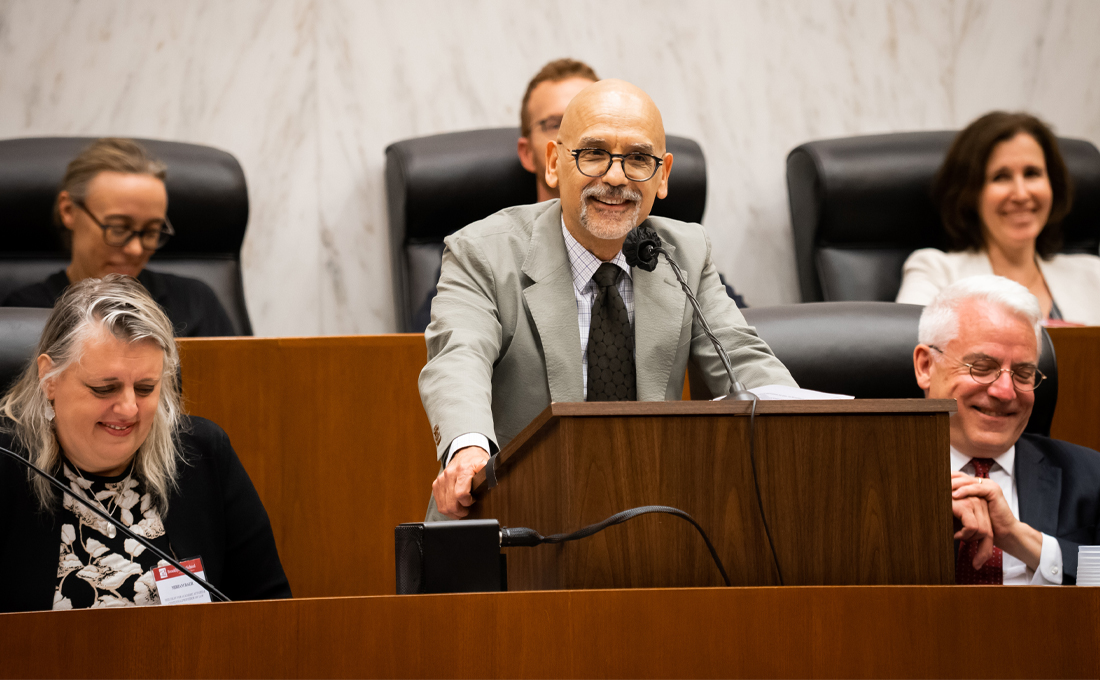Reprising Role of Vice Dean, Professor William Araiza Plans to Build on Success

Professor William Araiza, whose sense of humor drew smiles from his colleagues and helped ease the nerves of incoming students at the 2023 Convocation, will take on the role of Vice Dean this academic year.
Stanley A. August Professor of Law William Araiza, a popular teacher and widely published scholar of administrative and constitutional law, is taking on the role of vice dean beginning this academic year, effective July 1.
The vice dean position is a vital dean’s suite role that requires lending an ear to myriad voices and keeping academic initiatives prioritized and running smoothly in a complex environment. Araiza, who has previously held the position both here and at his previous law school, Loyola Law School-Los Angeles, seems a natural for the role given his scholarly focus on governmental rules, structure, and the legal frameworks that affect people’s everyday lives. Conducting the work with quiet efficiency, he said, is pivotal.
“The vice dean’s core job is to make sure that everything runs the way it should,” Araiza said. “If they're doing their job, the vice dean ought to be invisible. People shouldn't see all the paddling that's going on under the surface. All they should see is the boat moving across the water without any seeming problems or disruptions.”
The prospect of smooth sailing is off to a good start, thanks to work of President and Joseph Crea Dean David D. Meyer and Araiza’s predecessor in the role, Vice Dean and Centennial Professor of Law Miriam Baer. Araiza saluted their successful efforts to elevate the school’s bar examination passage rates (last year’s scores were up 9 points, the highest in a decade, through a focus on bar preparation). He also touts their leadership in programming to prepare students for the NextGen Bar Exam, which New York State launches in 2028.
“Miriam, in conjunction with some faculty members who have been working on this issue, has been able to get us on a path toward being able to respond to that new bar exam, helping our students succeed on the new exam,” Araiza said. “That work has to continue.”
Another focus area involves maintaining a strong faculty, particularly as more senior faculty are expected to retire in the next several years. This year, the school is bringing in four new professors, “exciting new hires,” Araiza says, who will be augmenting a faculty that is renowned for its scholarly impact. That level of hiring will carry on.
“Similar to other law schools, we are under a continual need to replenish our ranks, and so making sure that we select a really terrific, excellent core of teachers and scholars is critical to the law school’s ability to continue to thrive in the future,” Araiza said. “Working with our appointments committee is going to be another priority for me, to make sure that we actually can restaff in ways that we need.”
Yet a third priority is one that has already been impacting the field of law and legal education, and that is artificial intelligence (AI). Knowing that students will most likely use AI after starting their legal careers, faculty members must weigh how they may deploy it now. It is a decision that impacts the expectations of their performance on assigned work, and even the ratio of take-home exams, for which students may be using AI, versus in-class exams.
“It's not like the world of 50 years ago or even the world of five years ago. This is really going to be a different world in terms of practice and figuring out how we prepare our students to be effective lawyers in a world that's going to be marked by AI,” Araiza said. “It is going to be a long-term challenge, but one that's going to hit us very quickly.”
An additional priority for the role is keeping on top of the regulatory environment that the Law School operates in. Because it is an independent school, Brooklyn Law School is not as reliant on federal funding as a big research university that requires National Institutes of Health grants to conduct its scholarship might be. But that does not mean the school is immune from the financial cuts and scrutiny that its peers in academia face. Federal financial aid for students is a concern.
“The regulatory environment facing law schools is undergoing massive changes, and we're going to need to respond to those changes and whatever comes out of the regulatory apparatus, out of the federal government, and, to a lesser degree, the state government, as they change their understandings of how they should be interacting with legal education,” Araiza said. “Dean Meyer very much has his finger on the pulse of this. He and the other law school deans are monitoring what's going on in Washington very carefully.”
To perform his new role, Araiza will have to pause on the upper-level classes he normally teaches in First Amendment Law and Administrative Law, but he will still teach Constitutional Law, a first-year class in which students, in reviews, note Araiza’s patient teaching style and deep knowledge of the subject matter.
“Our 1L students, as they are integrating into the law school, need to get to know the Vice Dean, and what better way to do that than in a classroom setting?” Araiza asked. “I really, truly believe that someone in this role ought to teach.”